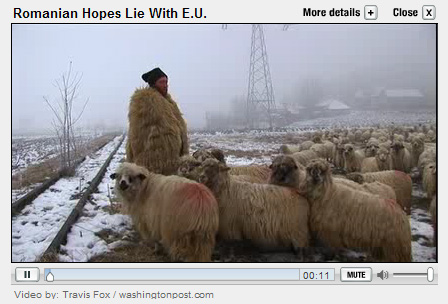Kevin Sullivan of the Washington Post returned to Romania for a second story in one month. His first, about the American air force base built in my homeland, was enjoyable if only because it carefully dealt with a cultural cliche: the endless wait for the Americans.

His second fails because Sullivan embarks on a journey of stereotyping and cliche-dropping. The story, as a much angrier Luiza pointed out, is valid as news (Luiza actually sent me an e-mail about the story with the subject “wtf? wp?”). Romania is hoping to join the E.U. in 2007 and there is great anticipation and nervousness about this prospect. But from reading Sullivan you’d think the slaughtering of pigs is the biggest change facing Romania as the E.U. rolls in. It’s one of them, sure — but is the lead of a Washington Post story? For the record: I think the 10-minute video version of the story from which the stills are taken is better.
Can a reader learn anything about Romania’s efforts to join the E.U. if the killing of pigs is the catch-all metaphor? I don’t think so. I do give Sullivan the benefit of the doubt — reporting on foreign countries is hard and it’s even harder not to fall into the trap of telling the same story of the forgotten savage country hoping to be rescued.
What is even more frustrating is that the piece was initially uploaded with the following headline: “The E.U.’s Reshaping of Romania.” The sub-head said: “In preparation for entry, nation tackles rampant corruption, ingrained discrimination.” Four hours later, the headline online said: “Out of the darkness.” And the sub-head: “Romania tried to shed its traditional past for entry in the E.U.”
I can just image the copy editors scrambling about the newsroom asking for a juicier, punchier headline on Romania. Hey, it’s Romania y’all! Why the neutral lead? They are f-ed up enough to warrant “darkness” slapped next to the name.
I am posting this before seeing the actual newspaper (it should be here in three hours) and I’m doing it soon after having sent an e-mail to both the paper and the reporter. The text of the letter is below:
========
Dear Mr. Sullivan,
I appreciate the interest you took in my native country of Romania and the willingness of the Washington Post to print two stories from there in a month. Both as a subscriber, and as a Romanian journalist living in Washington, D.C., I have come to know these stories are rare.
Your piece on the opening of the American military base was a great read. It’s an important issue to the country and probably a strategic move in the region. I also enjoyed the theme – it was about time the Americans came to Romania.
I am disappointed though with your second piece. I am writing this the night before the paper arrives, having only read the story online. Already I see the headline has been changed from a neutral “The E.U.’s reshaping of Romania” to a pathetic “Out of the darkness,” which is an unfortunate stereotype to kick off with. Even more unfortunate is that you choose another stereotype as your lead. I would not have led a piece about America with an image of a mega-church, nor a piece about Kazakhstan with horse slaying (the Post did).
Yes, pig slaughtering happens and it is common, but is it really a catch-all metaphor for Romania joining the EU? I understand the practice along with the “spouting blood†must fascinate foreigners, but it’s a cheap gimmick to lure readers in. It is there simply for its oddity and tinge of savageness.
I wish you wouldn’t have taken the easy way out. You constructed the story opposing the confused, the disenfranchised and the poor to the very powerful, thus perpetuating the narrative of a hopeless and cruel Romania. While you were in Targu Mures – my hometown – why didn’t you stop to talk to my father, a doctor, who has refused to give up on the country despite the corruption and rampant pig slaughtering. For the past 15 years he has built an NGO to help kids with special needs and just recently the foundation won a huge award for having the best projects in the country. People like him have plenty to say about the coming year and they will be, to some degree, the ones having to translate the impact of joining the EU to the rest of us.
Certainly I was not the intended audience for this piece and it’s what saddens me most. You have told nothing to your readers about what it actually means to be in the E.U. or to have Romania join the group. Nothing about what Romania has struggled with in closing some of the chapters. No context on the process, the delays, the push and pull. And I refuse to believe you didn’t have some of that in your notes.
I am sorry you decided to use the slaughtering of pigs and the discrimination of Roma to define Romania. Add that to the orphans, the selling of children, the wild dogs and Dracula. I have tried my best to paint America as complex as possible in my dispatches to Romanian media. I guess I should stop and take the easy way out — referring to President Bush as a former failed businessman while filing dispatches from catch-all locations like Boulder.
I appreciate the chance to read about my country in the Washington Post, but it’s time the paper took some time to shake-up the master narrative it’s perpetuating on the subject.
Sincerely.
========
* Click here to read about my first six months as a subscriber to the Washington Post.
* And click here to see me stereotype my country in a Christian Science Monitor op-ed. We’ve discussed the piece on this blog here.


 A very good friend of mine wrote an awesome story for the Sarasota Herald-Tribune. It’s
A very good friend of mine wrote an awesome story for the Sarasota Herald-Tribune. It’s 

